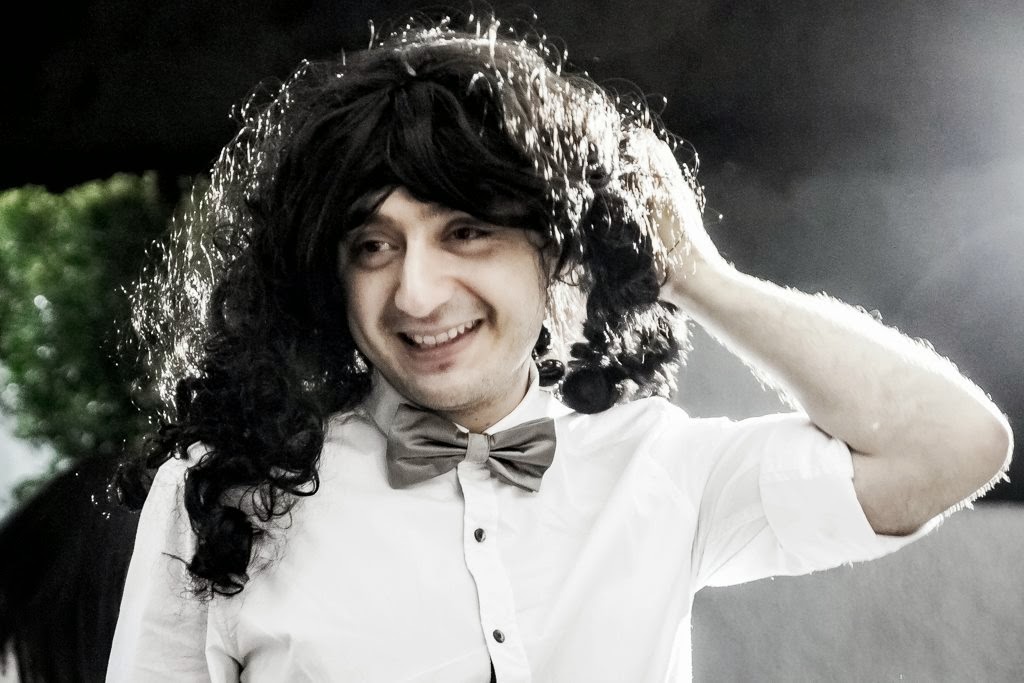Por vacuidad
Es cuando menos interesante que una frase aparentemente contradictoria como
todo ser inmortal muere
sea verdadera dentro de la lógica moderna. ¿Por qué? Por vacuidad: una afirmación universal es verdadera si no existe ningún elemento que satisfaga su premisa.
Y sólo para completar, esa misma afirmación es falsa dentro de la lógica clásica, en particular la lógica aristotélica con los silogismos que nos enseñan en preparatoria. Para Aristóteles, si una afirmación universal se satisface, entonces su análogo existencial también lo hace. Es decir, la veracidad de "todo ser inmortal muere" implica la existencia de un ser inmortal (en particular uno que muere).




12 comentarios:
Hello Rafael,
Could you show me a (e.g. sequent calculus) proof of a formalization of that sentence ("todo ser inmortal muere")?
Of course! Quite easily, actually. The only point to take into consideration is that I never said that the sentence is a tautology, just that it is true in our world. For the ancient greek it would have been false even if they had our understanding of universal sentences. So, it is true provided the premise that there is no immortal being.
For a sequent calculus proof you only need to apply the (left) weakening rule once, and you are done.
Well, you hadn't said "true in our world" either. You had said "true inside modern logic", which is quite informal, and that's why I asked further clarifications about your assumptions.
You assume that everybody dies in our world, and then that sentence is true according to modern logic indeed. But I still don't see what the vacuous truth of this sentence has anything to do with universal quantification.
To make things more precise, I will formalize the sentence as follows:
"x is immortal" = I(x)
"x dies" = D(x)
S) "all immortals die" = All x.(I(x)--> D(x))
We assume the following axioms are true in our world:
1) All x.(I(x) <--> not D(x))
2) All x.(not I(x))
If we formalize things like this, we conclude that S is true, because according to axiom 2, there are no x such that I(x), and hence "I(x) --> D(x)" is vacuously true, because the antecedent of the *implication* is always false.
So, I think that the vacuous truth of that sentence has more to do with the fact that A --> B is always true when A is false, than with universal quantification.
On the other hand, you might want to formalize S in a different way:
S') all x.(D(x))
And you assume that your domain is the set of immortal beings.
Then you could say that this domain is empty, and hence S' is vacuously true because of a vacuous universal quantification.
Did you mean something like that?
If that was the case, I just would like to remark that at least in proof theory (which is a significant part of modern logic), empty models/domains are usually ignored. For example, there is a sequent calculus proof of the sentence:
S'') exists x.(P(x) or not P(x))
Since there is a proof, we say that S'' is valid (true in *all* models), even though it is vacuously false in any empty model.
Aha! I see what is the problem here, and, without meaning to offend, it is that you are too deep into proof theory ;)
We are having a vocabulary clash. Actually, a "universal statement" is _not_ a universal quantification; is merely an implication: "every X is a Y". An existential statement, by the way, is a conjunction: "there is a X that is also a Y".
Our difference is the use of free variables. My statement
I(x) -> D(x)
is implicitely your universally quantified one. This statement is true if in _every model_ (I am with you, empty models are not considered) every individual that satisfies I satisfies also D.
I add now a restriction that says that no immortal exists; that restricts the set of models to those that have an empty set of individuals satisfying I: by vacuity (as you well said, of the premise of the implication) the statement becomes true.
Thus, I don't restrict the domain to a specific one, but only restrict the possible interpretations by means of further "axioms".
What I wanted to emphasize here is the difference with Logica Aristotelicum, where the statement becomes true only if additionally, there exists an individual satisfying I, and thus, such a fact is trivially false.
Indeed!
From my point of view, though, you are too deep into Description Logics! ;-) (Ahh... All those TBoxes, in which implications are implicitly universally quantified...)
Anyway, now it is clear that what we are talking about here is that old linguistic-philosophical discussion about "material implication" (the most used form of implication in modern logic and mathematics) and its alternatives (one of them is probably the one used by aristotles)...
But I wouldn't say that modern logic uses material implication all the time, instead of some other kind of aristotelian implication. A counter example is "linear logic". If we have:
1) A
2) A --> B
3) A --> C
We can conclude either B or C in linear logic. But we cannot conclude "B and C", even though we could in aristotelian logic or in modern "classical logic" or "intuitionistic logic"...
I think, nowadays in modern logic there are so many logics that you can find any kind of implication or whatever other connective that you would like. I guess you could even do many illogical things with many logics... :-D Modern logic is as much about logical things as about illogical things... :-D
(By the way, what I don't like much in Description Logics is all this reinvention of terminology... I didn't know that it had gone so far that "implications" are now being called "universal statements"... Let's keep it simple!)
:-( I'm late to the discussion. Yeah, I wanted to argue similar things.
Btw, I'm reading The Emperor's New Mind, very cool stuff. Made me think about what does it mean for something to be "true". Amazingly, I think that I'm still unable to grasp what "true" really means. I guess it's also the effect of doing too much formalization in several different logics. :-P
If "truth" is a problem for you, then come to *proof theory*. In Proof theory we disregard "truth" and other sorts of semantical considerations entirely. All that matters is provability... :-)
"The Emperor's New Mind" is very interesting indeed, although some parts of it (especially in the end) are too speculative...
I don't think I am qualified enough in epistemology to get into the question of "truth", but there are roughly two branches in philosophy of science: ones think that science should represent "reality", while the others say that science is just a description from which "reality" is possibly a model.
I would belong to the second group, and for me it means that it is irrelevant if there is a(n) (objective, external) truth, since my description will always include other (non-real) models.
The other approach, as Bruno says, is proof theory. If a proof theorist belongs to the first group, then "truth" equals provability for him; if belongs to the second, then all we can know is what we can prove to hold for certain.
Of course I am over-oversimplifying things here, but should give a rough idea in there.
Yes. And I also belong to the second group.
Just a comment about the following sentence:
"since my description will always include other (non-real) models."
It is also interesting to take into account the Löwenheim-skolem theorems here. If our theories are first-order, then we would always have infinitely many models of arbitrary non-intended cardinalities.
On the other hand, if we have theories written in second-order logic, the Löwenheim-skolem theorems do not hold, and it is possible to have "categorical" theories, for which there is only one model up to isomorphism.
Since scientific theories are not restricted to first-order logic, I think Scientists belonging to the second group can still have the ambition of describing "the reality" up to isomorphism...
Another funny thing is the different meaning of the word "model" in different communities. Logicians usually say that a model/reality/world models a theory. On the other hand, other scientists (physicists, biologists, engineers...) usually say that their theories model (parts of) the reality.
Hi Both!
First replying to Bruno, yes, I'm quite comfortable with proof theory, I get the idea of having (meaningless) symbols that are simply transformed by following sets of rules.
The particular problem I was having is about Gödel's incompleteness theorem (as read for example in Penrose's book). It is claimed that one can find some statement "G" which is neither provable nor disprovable in some formal system. That's fine, I can get that. My problem is that, nevertheless, it is claimed that "we" as humans can "see" that the sentence "G" is in fact "true". And I'm still having problems with that. They give a simple argument which of course I can follow, but it feels a bit like cheating, because the argument (of course) can not be "formal" (within the same system), so, well, I'm running in circles trying to understand what does it mean to call something "true" outside of a formal system.
Now, on the "philosophy of science", I would declare myself more of a pragmatic guy. I think that theories (particularly in mathematics, but in other disciplines as well) are objects completely independent of the "reality". This objects simply become useful as long are their assumptions somehow "hold" (in some weak sense) in the reality and then they allow us to make predictions on the outcome of future events.
I think this places me closer to the second group described by Rafael. But I don't think that the "ultimate goal" of science should be to build the "ultimate theory of everything" whose assumptions actually "hold" (in a strong sense) in the reality. For me, the current evidence (incompleteness theorems, uncomputable numbers, unsolvable problems, even quantum uncertainty) suggests that this might even be a fundamentally impossible task.
I think the goal of science is, instead, simply to provide theories which "sometimes work", as long as your assumptions seem to hold and the predictions of your theory are reasonably good for you, then you're happy. If your theory stops working at some point, then you need a new theory, with different assumptions, and so on.
I hope this makes some sort of sense.. would have liked to take some time to express my thoughts more clearly. But with so many things I want to do lately, time is getting increasingly difficult to find!
Gödel's theorems are too technical and complex to discuss in comments in a blog...
There is a book called "Godel's Theorem: An Incomplete Guide to Its Use and Abuse". I haven'T read it myself, but it was recently used in a seminar here in Vienna, so it should be interesting.
Although Gödel's theorem is nowadays usually stated with respect to truth and provability, it originally had nothing to do with truth... I think it even historically precedes Tarski's definition of truth... So, at that time, people probably did not even have a precise understanding of truth...
Regarding the relation of Gödel's theorem with theories of everything in Physics, people are discussing this topic right now in the FOM (Foundations of Mathematics) mailing-list. We (the interest group in Logic and Physics here in Vienna) decided to do a seminar about this topic this semester, but it hasn't started yet.
Best Regards!
http://bruno-wp.blogspot.com
http://www.logic.at/people/bruno/
Hey Bruno, thanks for your comments! I'm certainly looking forward to reading some more formal presentation of Gödel's theorem. That will be probably my next book in the reading queue. I've also just signed up at the FOM mailing list. Thanks for the pointers!
Publicar un comentario